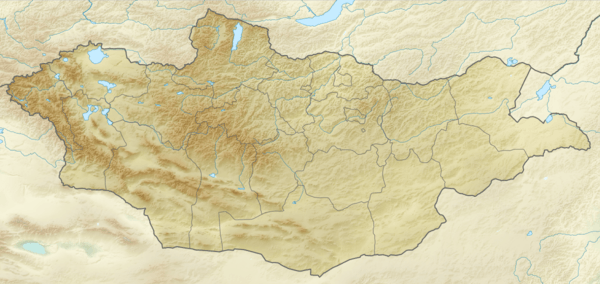Andaikhudag Formation
The Andaikhudag Formation, in older literature referred to as Unduruh Formation or Ondorukhaa Formation, is an Early Cretaceous (Hauterivian to Barremian) geologic formation in Mongolia.[1] Dinosaur remains diagnostic to the genus level are among the fossils that have been recovered from the formation.[2]
| Andaikhudag Formation Stratigraphic range: Hauterivian-Barremian ~132–125 Ma | |
|---|---|
| Type | Geological formation |
| Lithology | |
| Primary | Shale |
| Other | Sandstone |
| Location | |
| Coordinates | 46.0°N 99.6°E |
| Approximate paleocoordinates | 47.2°N 100.3°E |
| Region | Bayankhongor Province |
| Country | |
 Andaikhudag Formation (Mongolia) | |
Fossil content
The following fossils have been reported from the lacustrine shales and secondary sandstones of the formation:[1]
- Birds
- Ambiortus dementjevi[3] - "Vertebrae and forelimb"[4]
- Holbotia ponomarenkoi[5]
- Insects
- Hymenoptera
- Diptera
- Coleoptera
- Allophalerus bontsaganensis[11]
- Tetraphalerus notatus[11]
- Plecoptera
- Accretonemoura radiata[12]
gollark: I just checked and heavserver apparently has 40% retention. No idea how that works.
gollark: Do you know how our metrics actually compare with others, though?
gollark: You don't know the causes of that though.
gollark: That was an hour if you ignore the ways in which it was not an hour.
gollark: Great, back in maybe an hour or so.
See also
- List of dinosaur-bearing rock formations
- Tsagaantsav Formation
References
- Andaikhudag Formation in the Paleobiology Database
- Weishampel et al., 2004, pp.517-607
- Kurochkin, 2000
- "Table 11.1," in Weishampel et al., 2004, p.214
- Zelenkov & Averianov, 2015
- Rasnitsyn, 1991
- Rasnitsyn, 1993
- Kopylov, 2009
- Blagoderov, 2000
- Kalugina, 1993
- Ponomarenko, 1997
- Sinitshenkova, 1987
Bibliography
- Zelenkov, Nikita V., and Alexander O. Averianov. 2015. A historical specimen of enantiornithine bird from the Early Cretaceous of Mongolia representing a new taxon with a specialized neck morphology. Journal of Systematic Palaeontology Online edition. .. doi:10.1080/14772019.2015.1051146
- Kopylov, D.S. 2009. A new subfamily of Ichneumonids from the Lower Cretaceous of Transbaikalia and Mongolia (Insecta: Hymenoptera: Ichneumonidae). Paleontological Journal 43. 83–93.
- Weishampel, David B.; Peter Dodson, and Halszka Osmólska (eds.). 2004. The Dinosauria, 2nd edition, 1–880. Berkeley: University of California Press. Accessed 2019-02-21. ISBN 0-520-24209-2
- Blagoderov, V.A. 2000. New fungus gnats (Diptera: Mycetophilidae) from the Cretaceous and Paleogene of Asia. Paleontological Journal 34. S355–S359.
- Kurochkin, E.N. 2000. Mesozoic birds of Mongolia and the former USSR in M. J. Benton, M. A. Shishkin, D. M. Unwin, & E N. Kurichkin (eds.), 533–559. The Age of Dinosaurs in Russia and Mongolia.
- Ponomarenko, A.G. 1997. New beetles of the family Cupedidae from the Mesozoic of Mongolia - Ommatini, Mesocupedini, Priacmini. Paleontological Journal 31. 389–399.
- Kalugina, N.S. 1993. Khaoboridy i Komary-zvontsy iz Mezozoya vostochnogo Zabaykal'ya (Diptera: Chaoboridae, Chironomidae). in, 117–139. A. G. Ponomarenko (ed.), Mezozoyskie Nasekomye i Ostrakody Azii.
- Rasnitsyn, A.P. 1993. Novye taksony sepulek (Vespida: Sepulcidae) in, 80–99. A. G. Ponomarenko (ed.) Mezozoyskie Nasekomye i Ostrakody Azii.
- Rasnitsyn, A.P. 1991. Early Cretaceous evanimorphous hymenopteran families Stigmaphronidae and Cretevaniidae and the subfamily Kotujellitinae (Gasteruptiidae). Paleontological Journal 25. 172–179.
- Sinitshenkova, N.D. 1987. Istopicheskoe razvitie vesiyanok. Akademiya Nauk SSSR, Trudy Paleontologicheskogo Instituta 221. 1–142.
This article is issued from Wikipedia. The text is licensed under Creative Commons - Attribution - Sharealike. Additional terms may apply for the media files.